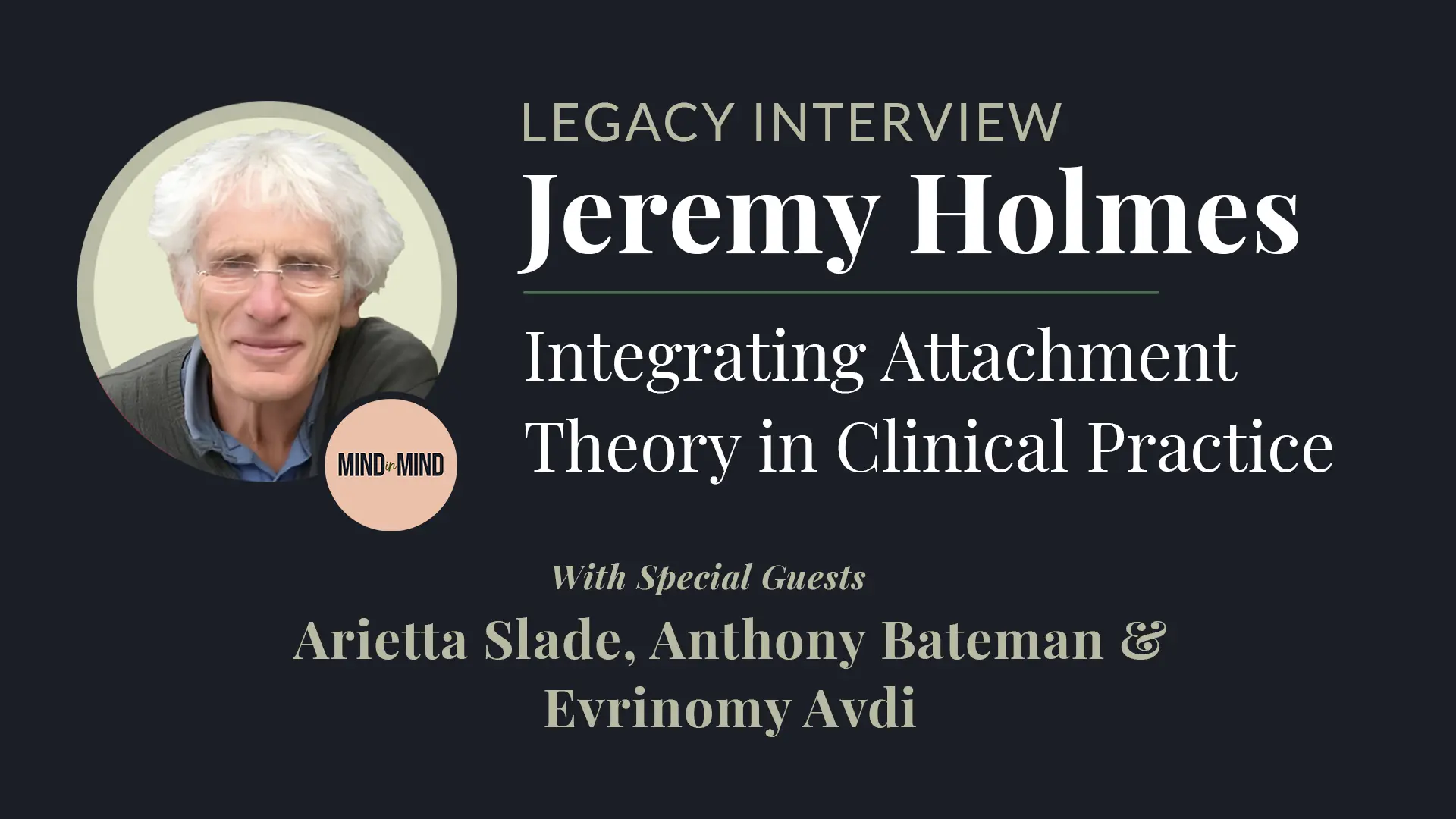July 2025
Clinical Applications of Dr Margot Sunderland's Integrative Approach
Clinical Applications of Dr Margot Sunderland's Integrative Approach
Following her Legacy Interview on 30 April, Dr Margot Sunderland will lead this practical ...

– Watch the full recording for £39 includes a 2 hour CEU/CPD certificate –
“I was intensely moved by the connectedness that I felt with every speaker. Their genuine transparency and openness allowed me to meet these extraordinary minds in a very ordinary way. I felt enriched, uplifted and validated by the content and the synchronicity of the panel.”
This Legacy Interview offers a unique opportunity to enjoy and learn from some of the field’s most respected voices in Attachment Theory and mentalization-based approaches. For over three decades, Jeremy Holmes has been a leading figure in psychodynamic psychiatry, influencing how clinicians worldwide understand and apply attachment principles in therapeutic settings. Through personal reflections and theoretical discussions, Jeremy discusses how attachment principles can enrich therapeutic practice while maintaining both scientific rigour and human warmth.
The conversation is enriched by the contributions of his special guests Arietta Slade, Anthony Bateman and Evrinomy Avdi who have collaborated with Jeremy over decades, offering valuable insights into the development of their own therapeutic practice and their contributions to the field. This recording is enriched by impromptu contributions from Jon Allen and Karl Friston, whose work on mentalization and neuroscience respectively has deeply influenced the field.
Jeremy shares his understanding of how early experiences, including his father’s wartime injury and subsequent hospital stay, influenced his journey into psychiatry and his deep appreciation of attachment theory. He explores how these experiences shaped his interest in trauma, caregiving, and recovery – themes that would become central to his work.
The conversation explores important clinical concepts including:
Anthony Bateman shares insights from their early connection at University College Hospital, where Jeremy’s creative and integrative approach to psychiatry made a lasting impression on him as a junior doctor. He describes how Jeremy’s leadership at the Royal College of Psychiatrists was crucial in maintaining psychotherapy’s place within psychiatry during a time of tension between psychodynamic and biological approaches. Jeremy’s practical wisdom influenced the development of Mentalization-Based Treatment (MBT)- leading to the creation of the now widely-recognised MBT approach.
Arietta Slade describes her determination to meet Jeremy early in her career- marking the beginning of a lively, highly productive and ongoing intellectual partnership. Her emphasis on the fundamental importance of “knowing a lot about people” in therapeutic work led to what Jon Allen affectionately termed “the Slade test” – the principle that however technical our theories become, they must ultimately enhance our human understanding. Her collaboration with Jeremy led to important work on understanding therapeutic sensitivity and the application of attachment principles in clinical practice.
Evrinomy Avdi discusses her innovative ‘Relational Mind’ research project, inspired by Jeremy’s ideas about the “social brain”. Her work examines therapeutic interaction at multiple levels – verbal, non-verbal and physiological – showing how therapeutic change emerges through a delicate dance of attunement and challenge between therapist and client. She highlights how Jeremy’s thinking about the balance between security and exploration plays out in moment-to-moment therapeutic exchanges.
 For more than three decades Jeremy Holmes has been a leading figure in psychodynamic psychiatry in the UK and across the world. He is Honorary Professor at the University of Exeter and was a consultant psychiatrist and medical psychotherapist at University College London. As the former Chair of the Psychotherapy Faculty of the Royal College of Psychiatrists he has been instrumental in advocating for the role of psychotherapy alongside psychiatry. Through his academic work, he has played a central role in promoting the ideas of John Bowlby, Mary Ainsworth and Mary Main and in developing the clinical applications – psychiatric and psychotherapeutic – of Attachment Theory in working with adults. Drawing on both psychoanalytic and attachment ideas, Jeremy has been able to encompass a truly biopsychosocial perspective.
For more than three decades Jeremy Holmes has been a leading figure in psychodynamic psychiatry in the UK and across the world. He is Honorary Professor at the University of Exeter and was a consultant psychiatrist and medical psychotherapist at University College London. As the former Chair of the Psychotherapy Faculty of the Royal College of Psychiatrists he has been instrumental in advocating for the role of psychotherapy alongside psychiatry. Through his academic work, he has played a central role in promoting the ideas of John Bowlby, Mary Ainsworth and Mary Main and in developing the clinical applications – psychiatric and psychotherapeutic – of Attachment Theory in working with adults. Drawing on both psychoanalytic and attachment ideas, Jeremy has been able to encompass a truly biopsychosocial perspective.
His integration of clinical practice, research, and theoretical development across different domains of mental health care has been a hallmark of his career. This includes significant research into personality disorders, and pioneering work on improving psychiatric inpatient care.
Perhaps one of Jeremy’s most important contributions has been his ability to bridge multiple perspectives – from neuroscience to literature, from attachment theory to psychoanalysis. He has published an astonishing range of books and papers. His latest work, “The Spirit of Psychotherapy” (2024), explores how psychotherapy represents a form of secular spirituality in our contemporary world, offering ways to navigate uncertainty and find meaning through the therapeutic relationship.

Together with Peter Fonagy, Anthony Bateman developed Mentalization-Based Treatment (MBT), now recognised worldwide as an evidence-based approach for treating personality disorders.
His decades-long collaboration with Jeremy Holmes has produced several influential works bridging psychoanalytic thinking with evidence-based practice. Their partnership, exemplified in cornerstone texts like ‘Introduction to Psychoanalysis’, has been particularly effective in making complex psychoanalytic ideas accessible and clinically useful.
Through their respective leadership roles, Anthony and Jeremy have helped ensure psychotherapy maintains a central position in mainstream psychiatry while remaining grounded in evidence-based practice. Their work together demonstrates how rigorous clinical thinking can be combined with practical therapeutic effectiveness.
He has served as Chair of the National Guideline Development Group for Eating Disorders in the UK and helped develop treatment guidelines for Borderline Personality Disorder. With over 150 peer-reviewed research articles and 18 books, he is a leading figure in contemporary medical psychotherapy.

Arietta Slade has advanced attachment theory, reflective parenting, and infant mental health through her work at the Yale Child Study Center and City University of New York. Her intellectual partnership with Jeremy, culminating in their collaboration on ‘Attachment in Therapeutic Practice’ and their co-editing of the six-volume ‘Collected Papers in Attachment,’ represents the meeting of two influential minds in attachment theory.
Like Jeremy, Arietta has devoted herself to making complex attachment concepts accessible and clinically meaningful. Her development of the Parent Development Interview, now translated into 18 languages and used in over 50 studies, parallels Jeremy’s efforts to bring attachment principles into everyday clinical practice.
As co-director of Minding the Baby™ at the Yale Child Study Centre and School of Nursing for the past 20 years, she has created innovative approaches to supporting vulnerable first-time young mothers and their babies – work that complements Jeremy’s interest in how attachment patterns influence adult mental health. Both recipients of the prestigious Bowlby-Ainsworth Award, their combined contributions have helped clinicians worldwide understand and work with attachment principles across the lifespan. You can watch Arietta’s Legacy Interview here.

Evrinomy Avdi brings together clinical psychology, research and psychoanalytic thinking at Aristotle University of Thessaloniki and the Anna Freud Centre in London. With degrees in Physics and Psychology, and specialist training in Psychoanalysis and Dramatherapy, she takes an interdisciplinary approach to studying therapeutic processes. Her research examines both verbal and nonverbal aspects of therapy interactions, with particular focus on parent-infant work and embodied processes in psychotherapy.
As Director of the Laboratory of Applied Psychology at Aristotle University, she combines teaching psychopathology and psychoanalytic psychotherapy with clinical practice and supervision. She is currently collaborating with Tessa Baradon at the Anna Freud Centre, studying moment-by-moment interactions in parent-infant psychotherapy sessions addressing early relational trauma. She serves on the editorial boards of major psychotherapy journals and is a member of the Scientific Board of the North-hellenic Psychoanalytic Society.
Jeremy was in conversation with Jane O’Rourke.
Jane O'Rourke – Founder of MINDinMIND and former award-winning BBC journalist turned Child and Adolescent Psychotherapist. Jane brings a unique skill set to create rich and thoughtful conversations, weaving together the personal and professional threads of her guests' journeys.
Details correct at time of recording – 29 January 2025
Holmes, J., 2013. John Bowlby and Attachment Theory. 2nd ed. Routledge.
Holmes, J., 2020. The Art of Psychotherapy. 4th ed. Routledge.
Holmes, J. and Slade, A., 2017. Attachment in Clinical Practice. SAGE.
Holmes, J., 2020. The Brain has a Mind of its Own. Confer.
Holmes, J., 2024. The Spirit of Psychotherapy. Karnac.